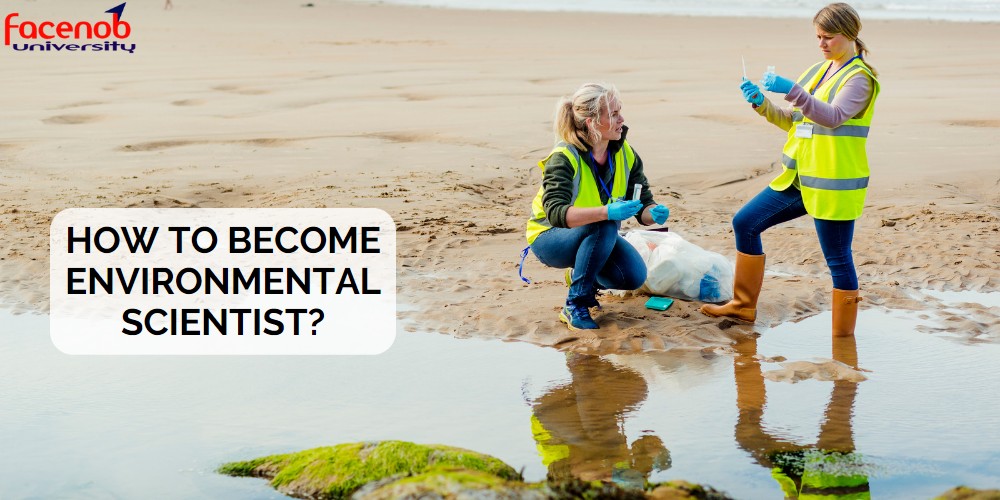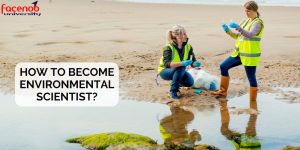How To Become Environmental Scientist?

Introduction of Environmental Scientist
Humanity is at a critical juncture when it seems we are hurtling heedlessly towards outright annihilation. Environmental Scientists may hold the key to our increasingly limited options to ensure the prospect of armageddon remains within the realms of fiction.
Also Known As
- Environmental Specialist

Typical Job Responsibilities
What do Environmental Scientists do?
An Environmental Scientist would typically need to:
- Use their understanding of the earth’s system to identify and eliminate hazards that endanger the environment and its inhabitants.
- Establish appropriate methods for collecting data for research projects, investigations, and surveys by established standards.
- Conduct field and laboratory research to gather, compile, and analyze environmental data from air, food, water, and soil samples.
- Investigate the nature and extent of soil, sediment, groundwater, and other medium contamination.
- Identify and evaluate valid environmental threats based on a scientific and statistical analysis of available data.
- Develop viable plans to prevent, eliminate, or control critical environmental issues such as land and water pollution; assist in pollution monitoring.
- Provide information and recommendations on potential environmental concerns to government bodies, corporate organizations, and the general public.
- Produce technical reports and presentations to present their research findings; work with senior scientists and other stakeholders.
- Conduct compliance monitoring, inspections, enforcement, technical support to relevant facilities, and corrective action.
Standard Work Environment
Environmental Scientists typically work in laboratories and offices, but some may spend time collecting data, conducting surveys, and monitoring environmental conditions in all types of weather.
Travelling to meet clients, other experts, and government officials, or presenting research results at conferences, could be part of your job.
Work Schedule
Most Environmental Scientists work more than 40 hours weekly, especially if your job requires fieldwork.
Employers
Finding a new job may appear difficult. Environmental Scientists can improve their job search by soliciting referrals from their network, contacting companies directly, using job search platforms, attending job fairs, leveraging social media, and contacting staffing agencies.
Environmental Scientists are generally employed by:
- State and Local Governments
- Consulting Firms
- Universities
- Manufacturing Companies
- Wildlife Conservation Groups
- Environmental Agencies
- Construction Companies
- Educational Institutions
- Engineering Services
- National Parks
- Private Organizations
Unions / Professional Organizations
Professional associations and organizations, such as the International Union for Conservation of Nature (IUCN), are critical for Environmental Scientists who want to advance their careers or connect with other professionals in their industry or occupation. Membership in one or more organizations adds value to your resume while strengthening your credentials and qualifications.
Workplace Challenges
- Limited understanding of the Earth’s priEarth’sogeochemical cycles and their impact on ecosystems, the atmosphere, and human activities
- Lack of adequate knowledge of the factors affecting biological diversity and ecosystem functioning
- Insufficient ability to predict climate variations
- Inadequate knowledge of and ability to predict changes in freshwater resources and the environment brought about by floods, droughts, sedimentation, and contamination
- Prevention of negatively impactful changes in the virulence and infectivity of pathogens that endanger plant, animal, and human health
- Increased understanding of the impact that institutions, such as markets, governments, and international treaties, have on human use of natural resources
- A logical plan for improving the life cycles of select critical materials widely used by humanity
- High probability of exposure to inclement weather conditions, pollutants, and contaminants in the field
- Ability to overcome personal and professional differences when collaborating as a team
- Emotional stress emanating from current environmental issues and lack of a positive go-to plan to overcome the challenges
Suggested Work Experience
Any academic programme that a potential Environmental Scientist pursues typically necessitates a period of supervised experience, such as an internship, to open up opportunities for employment and further education.
Gain experience by working as a volunteer or paid intern for a local government or business. You can also apply to environmental NGOs and charitable organizations.
Cooperative programmes, which exchange college credit for structured work experience, will also help you gain the hands-on experience most employers prefer.
When your tasks outside of the classroom perfectly align with your lessons inside, you will get the most out of them. When more experienced professionals turn seemingly routine incidents into unique learning moments, you may hear countless stories from them and gain valuable hands-on experience.
To demonstrate your commitment to course providers and prospective employers read about the profession and interview or job shadow established Environmental Scientists.
Recommended Qualifications
A bachelor’s degree in environmental science, biology, chemistry, physics, geosciences, or engineering is required for most entry-level jobs.
A good academic programme will include specialized courses in hydrology or waste management and regular biology, chemistry, geology, and physics classes.
While in high school, take college preparatory courses in physics, chemistry, biology, and math. English and speech classes will assist you in improving your research, writing, and oral communication abilities.
Certifications, Licenses and Registration
Certification validates an Environmental Scientist’s knowledge of industry-specific topics such as air, water, waste, brownfields, and green chemistry radiation, typically through work experience, training, and examination. Look for those that are relevant to your specific area of interest.
In a competitive job market, voluntary certifications in occupational safety, health administration, geographic information systems, and environmental operations can help you stand out.
Acquiring certification in environmental systems, environmental management, wetland delineation, erosion and sediment control, and stormwater management can help you advance your career.
You must have an accredited certification in Hazardous Waste Operations and Emergency Response to start a career in hazardous waste removal.
Projected Career Map
Environmental Scientists’ careers are driven by performance, experience, and the acquisition of professional qualifications. As Senior Environmental Scientists, Project Leaders, or Program Managers, they can focus on research or management.
You can advance to the Environmental Manager or Environmental Services Director level depending on the field you enter, such as nature conservation, pollution control, regional development, and environmental education.
Other options for advancing your career include consulting and freelancing.
Beneficial Professional Development
CPD will assist an active Environmental Scientist develop personal skills and proficiency through work-based learning, a professional activity, formal education, or self-directed learning.
CPD also aids in the timely renewal of desired certifications and licences. The workshops, conferences, and seminars you attend as part of your CPD will keep you updated on developments in the field while also allowing you to maintain your valuable network of contacts.
If you want to be a Consultant, you should get a master’s degree in environmental science or a related field. If you wantTosic research or postsecondary education, you must have a PhD in specific natural science, such as chemistry, biology, physics, or geology. Some, however, choose post-doctoral research in environmental science.
Conclusion
Environmental Scientists hold the future of our planet in their hands and heads, as every life on Earth is departing on the positive changes they can bring about through their expertise and ability to persuade the powers to make critical policy changes.
Advice from the Wise
“The more clearly we can focus our attention on the wonders and realities of the universe about us, the less taste we shall have for destruction.”
Explore Also: How to Become Enologist?
